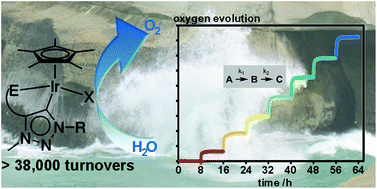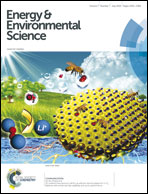Carbene iridium complexes for efficient water oxidation: scope and mechanistic insights†
Abstract
Iridium complexes of Cp* and mesoionic carbene ligands were synthesized and evaluated as potential water oxidation catalysts using cerium(IV) ammonium nitrate as a chemical oxidant. Performance was evaluated by turnover frequency at 50% conversion and by absolute turnover number, and the most promising precatalysts were studied further. Molecular turnover frequencies varied from 190 to 451 per hour with a maximum turnover number of 38 000. While the rate of oxygen evolution depends linearly on iridium concentration, concurrent spectroscopic and manometric observations following stoichiometric oxidant additions suggest oxygen evolution is limited by two sequential first-order reactions. Under the applied conditions, the oxygen evolving species appears to be a well-defined and molecular species based on kinetic analyses, effects of careful ligand design, reproducibility, and the absence of persistent dynamic light scattering signals. Outside of these conditions, the complex mechanism is highly dependent on reaction conditions. While confident characterization of the catalytically active species is difficult, especially under high-turnover conditions, this work strongly suggests the primary active species under these conditions is a molecular species.


 Please wait while we load your content...
Please wait while we load your content...